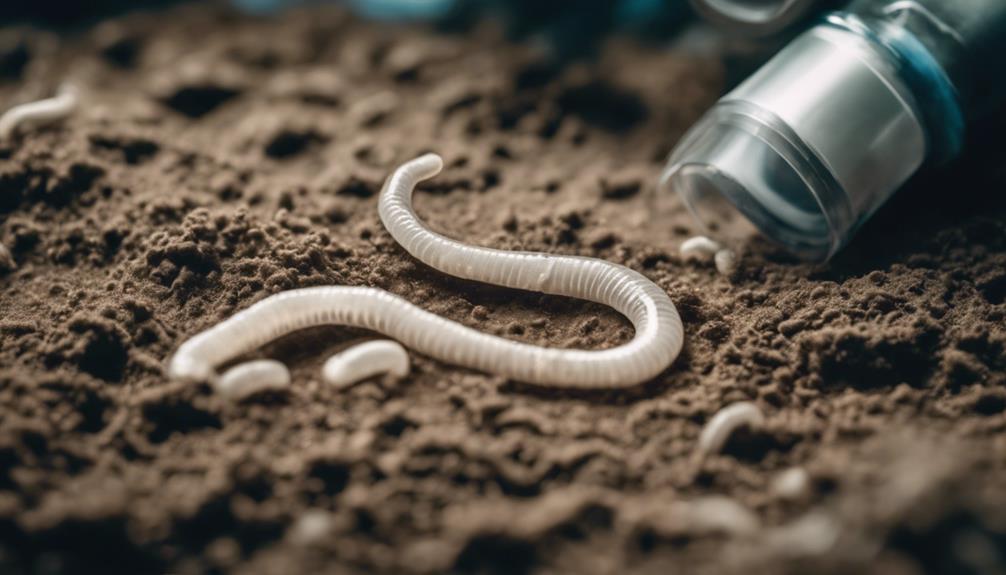The rise of drug-resistant hookworms in companion animals has raised significant concerns within the veterinary community. With conventional treatments losing efficacy against these resilient parasites, pet owners are left searching for effective prevention strategies.
While the threat looms larger, a glimmer of hope emerges through innovative research and collaborative initiatives aimed at tackling this evolving challenge. By exploring the landscape of drug-resistant hookworms and the preventative measures available, a proactive approach can be adopted to safeguard the well-being of our furry companions.
Key Takeaways
- Drug-resistant hookworms are spreading to family pets.
- Prevention includes avoiding high-risk areas and cleaning up after walks.
- New treatments like emodepside show promise in eradicating drug-resistant hookworms.
- Veterinary initiatives aim to track, limit, and develop solutions for drug-resistant hookworms.
Understanding Drug-Resistant Hookworms
In the realm of veterinary parasitology, a concerning trend has emerged with the rise of drug-resistant hookworms, posing challenges in the effective treatment of infections in dogs and other animals. Drug-resistant hookworms, once limited to greyhounds, are now spreading among the general dog population.
Common deworming drugs like fenbendazole, pyrantel pamoate, and milbemycin oxime are showing low efficacy rates against these resilient parasites. Even racing greyhounds, despite treatment, exhibit high rates of hookworm infections.
To combat this issue, new solutions such as emodepside, initially approved for cats, are being explored. Moreover, proactive initiatives led by organizations like the American Association of Veterinary Parasitologists aim to track and contain the spread of drug-resistant hookworms, urging vigilance and innovation in the field of parasitology.
Risks of Hookworm Infections
Exposure to hookworm infections poses significant health risks for dogs and humans due to the parasites' ability to cause anemia, weight loss, diarrhea, and weakness.
- Anemia can lead to fatigue, pale gums, and decreased exercise tolerance.
- Weight loss may be gradual but can result in malnutrition if left untreated.
- Diarrhea can be chronic and severe, leading to dehydration and electrolyte imbalances.
- Weakness can manifest as lethargy, reduced activity levels, and overall poor health.
- Severe infections can be life-threatening, especially in puppies, elderly dogs, or individuals with compromised immune systems.
Spread of Drug Resistance

The escalation of drug resistance among hookworms presents a pressing concern in both veterinary and public health sectors. The spread of drug-resistant hookworms, once limited to racing greyhounds, is now increasingly observed in the general dog population. Common deworming drugs like fenbendazole, pyrantel pamoate, and milbemycin oxime are showing reduced efficacy against these resilient parasites.
Despite treatment efforts, drug-resistant hookworms continue to thrive, posing a significant challenge for pet owners and veterinarians. As these resistant strains become more prevalent, there is a growing need for heightened surveillance, innovative treatment strategies, and collaborative efforts to contain the spread of drug resistance within hookworm populations.
Monitoring and addressing this issue promptly are crucial to safeguarding both animal and human health.
Effective Prevention Methods
Utilizing proactive measures is essential in mitigating the risk of drug-resistant hookworm infections in dogs and safeguarding their health. To prevent these infections effectively, consider the following strategies:
- Regular Deworming: Administer deworming medications as per your veterinarian's recommendations.
- Maintain Hygiene: Keep your dog and its living environment clean to reduce the risk of exposure.
- Limit Exposure: Avoid high-risk areas like dog parks and places with stray animal feces.
- Consult a Veterinarian: Seek advice from a veterinary professional on preventive measures and regular check-ups.
- Monitor Health: Regularly monitor your dog's health for any signs of infection and seek prompt veterinary care when needed.
Innovative Treatment Approaches

In the realm of combating drug-resistant hookworm infections, veterinary researchers are actively exploring innovative treatment approaches to address this growing concern. One promising approach involves the use of Emodepside, a dewormer approved for cats, which has shown potential in eradicating drug-resistant hookworms in dogs.
Additionally, a task force established by the American Association of Veterinary Parasitologists is dedicated to tracking and limiting the spread of drug-resistant worms. Veterinarians are advised to closely monitor treatment outcomes for hookworm infections, while also working on the development of new treatments specifically designed to control drug-resistant hookworms.
Insights from livestock management strategies are being leveraged to gain further understanding and potentially prevent hookworm infections in dogs more effectively.
Collaborative Efforts in Parasitology
Exploring collaborative efforts in parasitology aims to enhance the collective knowledge and resources available to combat drug-resistant hookworm infections in dogs and other susceptible populations. Collaborative initiatives play a crucial role in addressing the challenges posed by drug-resistant parasites.
Here are five key points highlighting the significance of collaborative efforts in parasitology:
- Sharing research findings and data among parasitologists worldwide.
- Establishing joint research projects to explore new treatment options.
- Collaborating with veterinary professionals to improve diagnostic techniques.
- Engaging with pharmaceutical companies to develop effective deworming medications.
- Partnering with governmental agencies to implement parasite control programs in high-risk areas.
Responsible Pet Ownership Practices

Practicing responsible pet ownership is essential for ensuring the well-being of dogs and other companion animals. This includes maintaining regular veterinary check-ups, providing a balanced diet, and ensuring proper hygiene practices.
When it comes to preventing drug-resistant hookworm infections, responsible pet ownership practices play a crucial role. Owners should clean up after their pets promptly to prevent the spread of hookworm eggs. Regularly deworming pets with the guidance of a veterinarian is essential in combating hookworm infections. Additionally, limiting a dog's exposure to communal areas where hookworm transmission is more likely can reduce the risk of infection.
Conclusion
In conclusion, the emergence of drug-resistant hookworms poses a significant threat to companion animal health.
It is crucial for pet owners to be proactive in preventing infections through strategic precautions and seeking guidance from veterinary professionals.
Ongoing research and collaborative efforts within the veterinary community offer hope for improved treatment outcomes and enhanced preventive strategies against this evolving parasite.
Responsible pet ownership practices are key in safeguarding beloved animals from the challenges posed by drug-resistant hookworms.




